By Leen Randell
Updated: Jul 04, 2024
10 Best Herbal Decoctions For Hoarse Voice
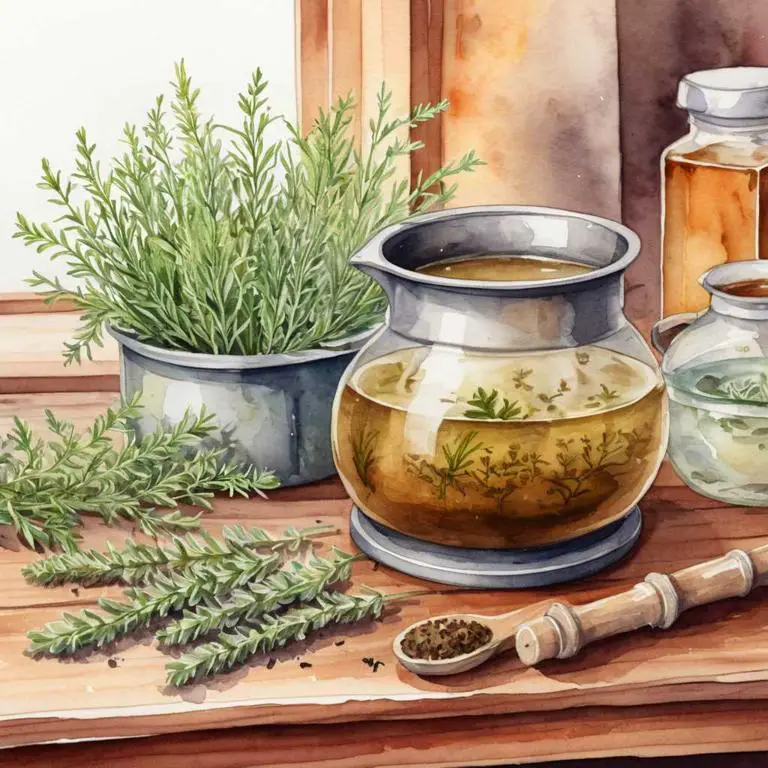
Herbal decoctions for hoarse voice are a natural remedy that combines herbs to soothe and calm an irritated vocal cord, restoring its normal tone and clarity.
These decoctions help by reducing inflammation, relaxing the vocal muscles, and providing antioxidant properties that protect the voice from further strain. Examples of herbal decoctions include thyme, slippery elm, and licorice root, which have been traditionally used to treat hoarseness caused by excessive shouting, singing, or allergies.
By using these decoctions, people with hoarse voices can enjoy improved communication, reduced vocal fatigue, and a more confident speaking ability, ultimately enhancing their daily lives and interactions.
The following article describes in detail the most important decoctions for hoarse voice, including medicinal properties, parts of herbs to use, and recipes for preparations.
- 1. Glycyrrhiza glabra
- 2. Echinacea angustifolia
- 3. Thymus vulgaris
- 4. Verbena officinalis
- 5. Melissa officinalis
- 6. Ginkgo biloba
- 7. Bupleurum falcatum
- 8. Taraxacum officinale
- 9. Urtica dioica
- 10. Gaultheria procumbens
- What is the best combination of herbal decoctions to use for hoarse voice?
- What ailments similar to hoarse voice are treated with herbal decoctions?
1. Glycyrrhiza glabra
Licorice decoctions helps with hoarse voice because it soothes and relaxes the vocal cords, reducing inflammation and irritation.
The anti-inflammatory properties of licorice root help to calm down swollen tissues in the throat, allowing for smoother vocal production. Additionally, licorice contains expectorant properties that help to loosen and clear mucus from the respiratory tract, further contributing to a clearer and more resonant voice.
By promoting healthy throat function, licorice decoctions can effectively alleviate hoarseness and promote a strong, clear voice.

Medicinal Constituents
The list below shows the primary medicinal constituents in Glycyrrhiza glabra decoctions that help with hoarse voice.
- Glycyrrhizin: This triterpenoid saponin helps soothe and protect the mucous membranes in the throat, reducing inflammation and irritation that can cause hoarseness.
- Flavonoids: These phenolic compounds have anti-inflammatory and antioxidant properties, which help to calm and heal the mucous membranes in the throat, reducing irritation and discomfort associated with hoarse voice.
- Saponins: These triterpenoid saponins have anti-inflammatory and mucolytic properties, helping to break down mucus and reduce inflammation in the throat, which can help alleviate hoarseness caused by respiratory infections or other conditions.
Parts Used
The list below shows the primary parts of licorice used to make decoctions for hoarse voice.
- Roots: As the primary part used in traditional medicine, Glycyrrhizin, a glycoside compound, is extracted from the roots to soothe a hoarse voice and reduce inflammation in the throat.
- Leaves: The leaves of Glycyrrhiza glabra contain flavonoids and saponins, which contribute to their anti-inflammatory properties and help in relieving hoarseness.
- Barks: The bark of the plant is another part used to make decoctions, containing compounds like flavonoids and phenolic acids that help in soothing a hoarse voice and reducing throat inflammation.
Quick Recipe
The following recipe gives a procedure to make a basic licorice for hoarse voice.
- Collect 20-30 grams of dried glycyrrhiza glabra roots from a reputable supplier.
- Crush the roots into fine powder using a mortar and pestle to increase surface area.
- Combine the powdered roots with 1 liter of water in a saucepan and bring to a boil.
- Reduce heat and simmer for 30-40 minutes to allow the active compounds to infuse.
- Strain the decoction using a cheesecloth or fine-mesh sieve and discard the solids.
2. Echinacea angustifolia
Kansas coneflower decoctions helps with hoarse voice because of its natural anti-inflammatory and antimicrobial properties.
The decoction soothes irritated mucous membranes in the throat, reducing inflammation and discomfort that can cause a hoarse tone. Additionally, its antibacterial agents help combat underlying infections that may be contributing to the hoarseness.
By calming the throat and eliminating infection-causing bacteria, Kansas coneflower decoctions effectively alleviate hoarseness, restoring a smooth and clear voice.
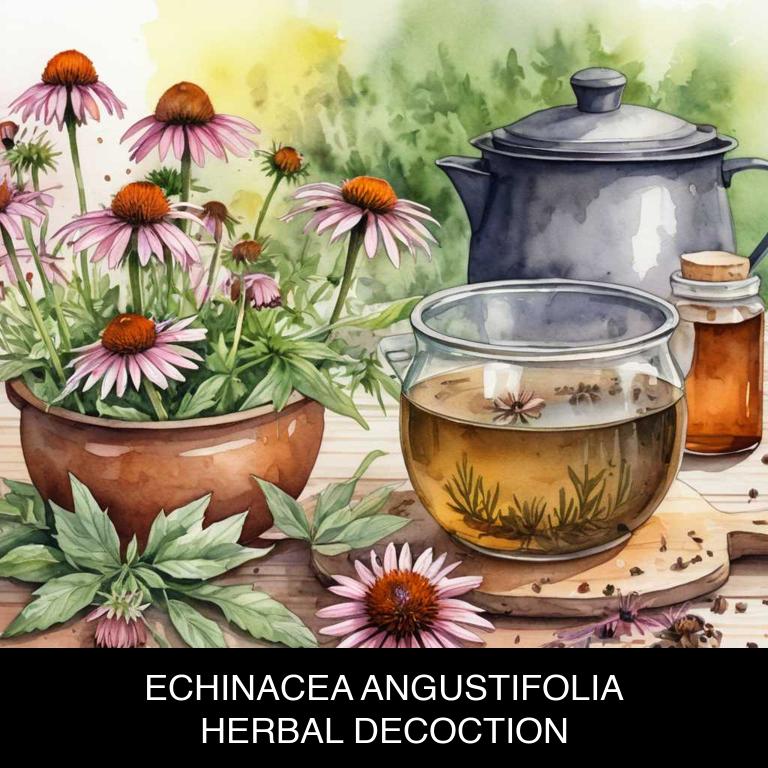
Medicinal Constituents
The list below shows the primary medicinal constituents in Echinacea angustifolia decoctions that help with hoarse voice.
- Iridoid glycosides: These compounds help reduce inflammation and promote healing in the mucous membranes of the throat, thereby soothing a hoarse voice.
- Alkaloids: These compounds have anti-inflammatory and antioxidant properties, which help protect the vocal cords from further damage and promote a faster recovery from a hoarse voice.
- Flavonoids: These compounds exhibit anti-inflammatory and antimicrobial properties, which help reduce swelling and prevent infections in the throat, thereby alleviating a hoarse voice.
Parts Used
The list below shows the primary parts of kansas coneflower used to make decoctions for hoarse voice.
- Roots: The roots are considered the most effective part for treating hoarse voice due to their high concentration of alkaloids and phenolic compounds.
- Leaves: The leaves are used to make decoctions for their purported ability to soothe and calm the throat, reducing inflammation and irritation.
- Flowers: The flowers are used to make decoctions for their purported anti-inflammatory and antiseptic properties, which help to reduce swelling and prevent infection in the throat.
Quick Recipe
The following recipe gives a procedure to make a basic kansas coneflower for hoarse voice.
- Harvest 1-2 pounds of echinacea angustifolia roots in the fall after the plant has gone to seed.
- Clean and dry the harvested roots in a well-ventilated area for several days.
- Chop 1 tablespoon of the dried root into small pieces to increase the surface area.
- Combine the chopped root with 2 cups of water in a saucepan and bring to a boil.
- Reduce the heat and simmer the decoction for 10-15 minutes and then strain it.
3. Thymus vulgaris
Thyme decoctions helps with hoarse voice because of its natural anti-inflammatory properties that soothe the throat and reduce swelling.
The antiseptic properties of thyme also help combat any bacterial or viral infections that may be contributing to the hoarseness. Additionally, thyme's expectorant properties help loosen and clear mucus from the vocal cords, allowing for a smoother and more comfortable flow of air when speaking.
This natural remedy can provide quick relief from a hoarse voice and promote overall throat health.
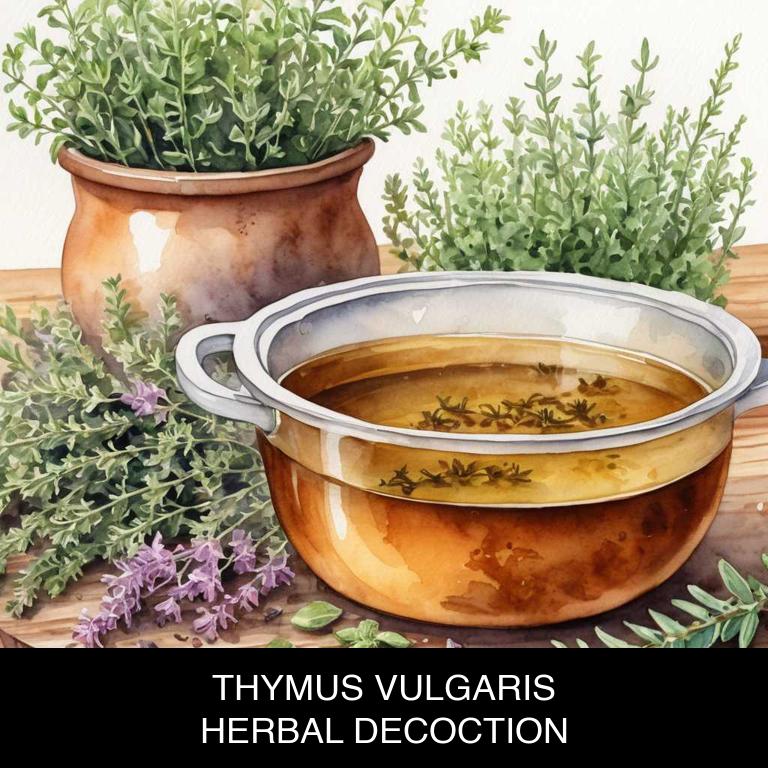
Medicinal Constituents
The list below shows the primary medicinal constituents in Thymus vulgaris decoctions that help with hoarse voice.
- Thymol: Thymol helps to reduce inflammation in the mucous membranes of the throat, thereby soothing a hoarse voice and promoting a smoother vocal tone.
- Carvacrol: Carvacrol has antimicrobial properties that can help to combat infections and inflammation in the throat, which can contribute to a hoarse voice.
- Rosmarinic acid: Rosmarinic acid is a phenolic compound with anti-inflammatory and antioxidant properties that can help to protect the mucous membranes of the throat from damage, reducing discomfort and hoarseness.
Parts Used
The list below shows the primary parts of thyme used to make decoctions for hoarse voice.
- Leaves: They are used due to their high content of thymol, a compound that helps soothe and calm the vocal cords.
- Stems: They are used for their ability to reduce inflammation and promote healing of the mucous membranes, helping to alleviate hoarseness.
- Roots: They are used because of their expectorant properties, which help to clear mucus and phlegm from the vocal cords, relieving hoarseness.
Quick Recipe
The following recipe gives a procedure to make a basic thyme for hoarse voice.
- Gather fresh or dried thymus vulgaris leaves and flowers in quantities of 1 to 2 teaspoons per 8 ounces of water.
- Combine the herbal material with water in a saucepan and bring to a boil over high heat.
- Reduce the heat to medium-low and simmer the mixture for 5 to 10 minutes.
- Strain the liquid through a cheesecloth or a fine-mesh sieve into a clean container.
- Store the decoction in the refrigerator for up to 24 hours or freeze for later use.
4. Verbena officinalis
Lemon verbena decoctions helps with hoarse voice because of its remarkable soothing properties.
The herb contains flavonoids, terpenes, and other bioactive compounds that work together to reduce inflammation and relax the vocal cords. As a result, it provides instant relief from scratchiness, dryness, and discomfort associated with hoarseness.
By calming the throat and promoting healthy mucus production, lemon verbena decoctions can help restore a smooth, clear tone to the voice.
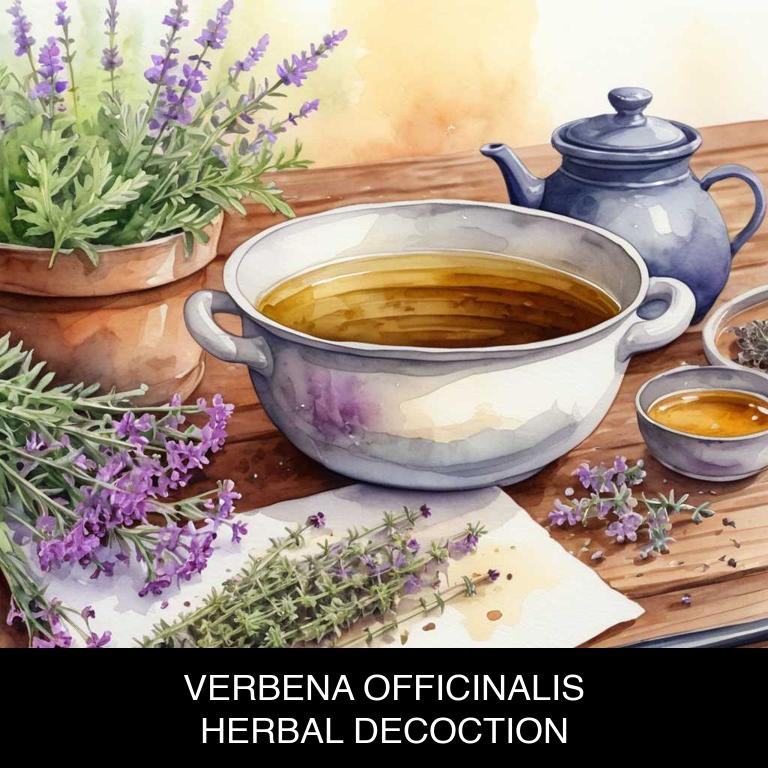
Medicinal Constituents
The list below shows the primary medicinal constituents in Verbena officinalis decoctions that help with hoarse voice.
- Flavonoids: These plant-derived compounds help with hoarse voice by reducing inflammation and soothing the mucous membranes in the throat, thereby alleviating discomfort and irritation.
- Rosmarinic acid: A phenolic compound with antioxidant and anti-inflammatory properties, rosmarinic acid helps to protect the throat tissues from damage and promote healing, which in turn can help alleviate hoarseness.
- Verbascoside: A triterpene glycoside, verbascoside has been shown to have anti-inflammatory and antioxidant effects, which can help to soothe the throat and reduce inflammation, thereby relieving hoarseness and promoting a healthy vocal tone.
Parts Used
The list below shows the primary parts of lemon verbena used to make decoctions for hoarse voice.
- Roots: Rich in saponins and flavonoids, roots are used to make decoctions for hoarse voice due to their soothing and anti-inflammatory properties.
- Leaves: Packed with antioxidants and flavonoids, leaves are used to make decoctions for hoarse voice due to their anti-inflammatory and protective properties for the vocal cords.
- Roots: Roots are also used to make decoctions for hoarse voice due to their expectorant properties, helping to relieve congestion and promote a healthy flow of mucus.
Quick Recipe
The following recipe gives a procedure to make a basic lemon verbena for hoarse voice.
- Harvest 10-20 fresh verbena officinalis leaves and stems from the plant.
- Wash the harvested verbena officinalis material with cool water to remove dirt.
- Chop 2 teaspoons of the cleaned verbena officinalis into small pieces using a sharp knife.
- Steep the chopped verbena officinalis in 1 cup of boiling water for 5-7 minutes.
- Strain the decoction through a cheesecloth to remove the verbena officinalis solids and discard the solids.
5. Melissa officinalis
Lemon balm decoctions helps with hoarse voice because of its natural anti-inflammatory properties.
When consumed as a warm drink, lemon balm soothes an irritated throat, reducing inflammation and discomfort caused by laryngitis or vocal strain. Additionally, the decoction's antispasmodic effects help relax tense vocal cords, allowing them to function more smoothly and reduce hoarseness.
As the soothing properties of lemon balm work to calm the throat, it helps restore a normal voice tone, making it an effective natural remedy for alleviating hoarse voice.
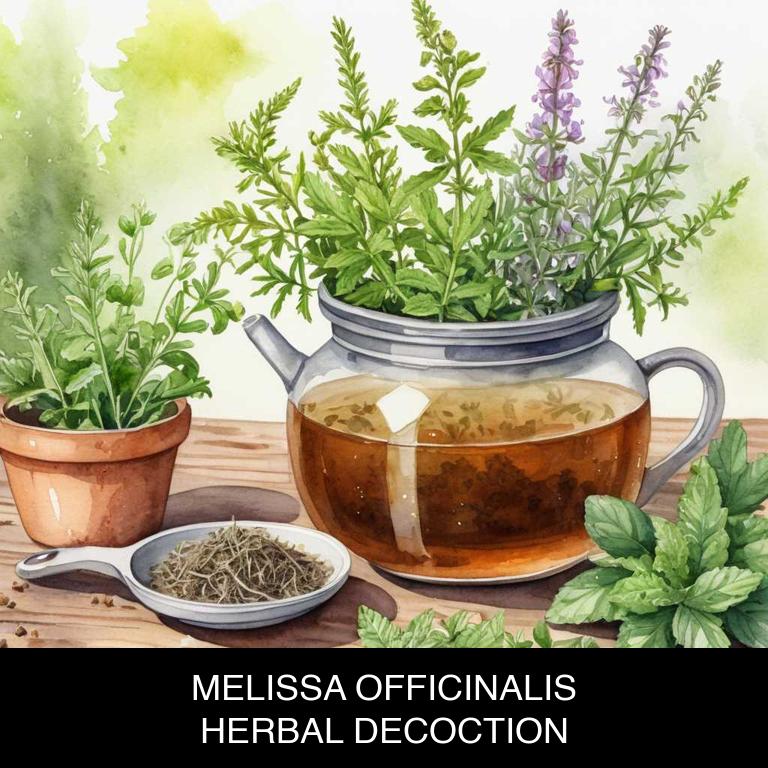
Medicinal Constituents
The list below shows the primary medicinal constituents in Melissa officinalis decoctions that help with hoarse voice.
- Rosmarinic acid: This phenolic acid has anti-inflammatory and antioxidant properties, which help soothe and calm the vocal cords, reducing inflammation and discomfort associated with a hoarse voice.
- Luteolin: This flavonoid has anti-inflammatory and antimicrobial properties, which help combat infections and reduce inflammation in the throat, leading to a smoother and more comfortable voice.
- Menthone: This monoterpenoid has a soothing and calming effect on the throat, helping to reduce inflammation and irritation, and promoting a healthy and normal voice.
Parts Used
The list below shows the primary parts of lemon balm used to make decoctions for hoarse voice.
- Leaves: They are rich in antioxidants and have anti-inflammatory properties that help soothe a hoarse voice.
- Flowers: They contain essential oils with calming and soothing effects, which can help reduce throat irritation.
- Roots: They have a long history of use in traditional medicine for their expectorant properties, helping to ease respiratory issues that may cause a hoarse voice.
Quick Recipe
The following recipe gives a procedure to make a basic lemon balm for hoarse voice.
- Harvest melissa officinalis leaves in the early morning after dew has dried to ensure freshness.
- Dry the harvested leaves in a warm place away from direct sunlight for 1 week.
- Combine 1 teaspoon of dried melissa officinalis leaves with 1 cup of boiling water and let steep for 5 minutes.
- Strain the decoction through a fine-mesh sieve or cheesecloth to remove solids and discard the solids.
- Store the cooled melissa officinalis decoction in the refrigerator for up to 3 days or freeze for later use.
6. Ginkgo biloba
Maidenhair tree decoctions helps with hoarse voice because of its unique combination of antioxidants, flavonoids, and saponins.
These compounds work together to reduce inflammation in the throat, soothing and calming irritated mucous membranes. Additionally, the decoction's antiviral properties help combat viral infections that can cause a hoarse voice.
The Maidenhair tree's natural anti-inflammatory agents also help to relax the vocal cords, promoting healthy circulation of blood and mucus, which ultimately leads to a smoother, clearer tone.
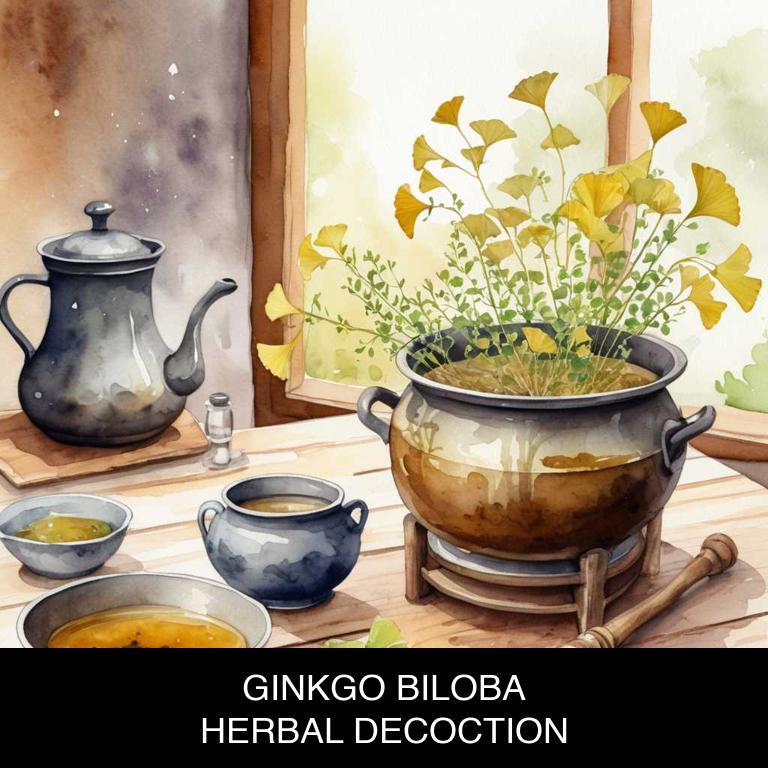
Medicinal Constituents
The list below shows the primary medicinal constituents in Ginkgo biloba decoctions that help with hoarse voice.
- Flavonoids: These compounds have anti-inflammatory properties, which can help reduce swelling and irritation in the vocal cords, thereby alleviating hoarseness.
- Bilobalide: This sesquiterpene lactone has been shown to have a protective effect on the vocal cords, reducing inflammation and oxidative stress, which can contribute to hoarseness.
- Quercetin: A flavonoid with antioxidant properties, quercetin can help reduce inflammation and oxidative stress in the vocal cords, promoting healing and reducing hoarseness.
Parts Used
The list below shows the primary parts of maidenhair tree used to make decoctions for hoarse voice.
- Leaves: The leaves of Ginkgo biloba are used to make decoctions for hoarse voice as they contain flavonoids and terpenoids that help to soothe the throat and reduce inflammation.
- Barks: The barks of Ginkgo biloba are used to make decoctions for hoarse voice as they contain anti-inflammatory compounds that help to reduce swelling and irritation in the throat.
- Fruits: The fruits of Ginkgo biloba are used to make decoctions for hoarse voice as they contain mucilages that help to soothe and protect the mucous membranes in the throat.
Quick Recipe
The following recipe gives a procedure to make a basic maidenhair tree for hoarse voice.
- Select fresh ginkgo biloba leaves with no signs of mold or damage to use in decoction.
- Combine 2 teaspoons of dried ginkgo biloba leaves or 4 teaspoons of fresh leaves with 1 quart of water.
- Boil the mixture for 5 to 10 minutes to release active compounds from the ginkgo biloba leaves.
- Reduce heat and simmer for 15 to 30 minutes to enhance the extraction of bioactive compounds.
- Strain the decoction using cheesecloth or a coffee filter to remove the leaves before serving.
7. Bupleurum falcatum
Chinese thoroughwort decoctions helps with hoarse voice because it has anti-inflammatory properties that soothe irritated throat tissues, reducing swelling and discomfort.
The decoction's expectorant properties also help to loosen and clear mucus and phlegm from the lungs and airways, relieving congestion and allowing for easier breathing.
Additionally, its antioxidant and antibacterial compounds work to combat infections and reduce inflammation, promoting a healthy throat environment that allows the voice to function normally.
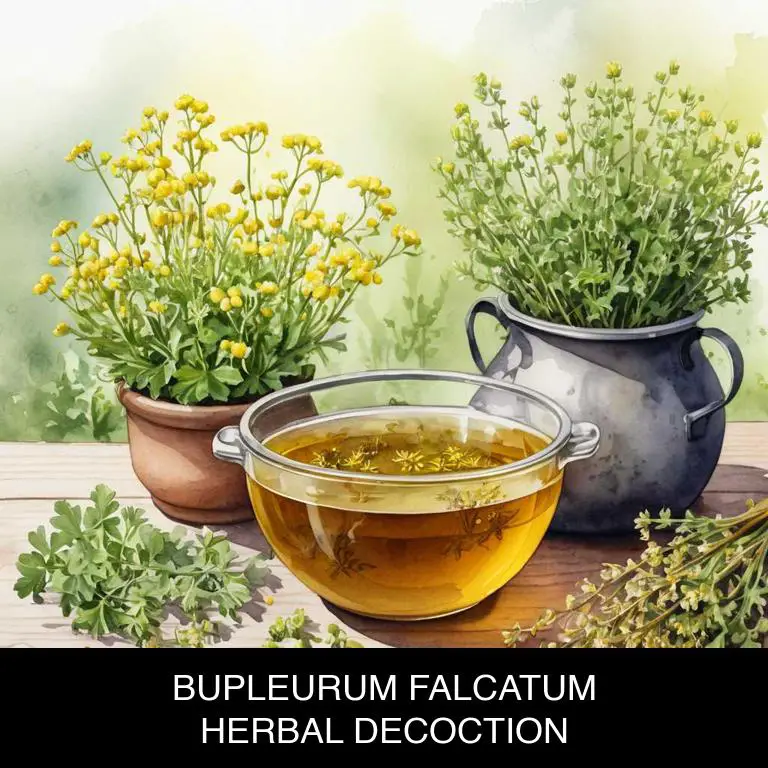
Medicinal Constituents
The list below shows the primary medicinal constituents in Bupleurum falcatum decoctions that help with hoarse voice.
- Saponins: Saponins help to reduce inflammation in the larynx and soothe the vocal cords, thereby alleviating the discomfort associated with a hoarse voice.
- Flavonoids: Flavonoids, particularly rutin and quercetin, have anti-inflammatory properties that can help to reduce swelling and irritation in the throat, making it easier to speak and reducing the risk of further vocal strain.
- Chrysophanol: Chrysophanol, a type of anthraquinone, exhibits anti-inflammatory and antimicrobial properties, which can help to combat underlying infections or irritations that may be causing the hoarseness.
Parts Used
The list below shows the primary parts of chinese thoroughwort used to make decoctions for hoarse voice.
- Roots: They are used for their medicinal properties due to the presence of various compounds that help in soothing the throat and alleviating hoarseness.
- Leaves: They are often used in decoctions to provide relief from hoarseness due to their expectorant properties, which help in thinning mucus and promoting a healthy cough.
- Barks: The barks of Bupleurum falcatum are used to make decoctions that help in soothing the throat and providing relief from hoarseness due to their anti-inflammatory properties.
Quick Recipe
The following recipe gives a procedure to make a basic chinese thoroughwort for hoarse voice.
- Harvest bupleurum falcatum roots and cut them into small pieces weighing about 6-12 grams.
- Boil 1 liter of water and add the root pieces for 30 minutes to 1 hour.
- Strain the liquid through a cheesecloth or a fine-mesh sieve into a clean container.
- Discard the solids and add honey or other sweeteners to taste if desired.
- Allow the decoction to cool and store it in the refrigerator for up to 3 days.
8. Taraxacum officinale
Dandelion decoctions helps with hoarse voice because it soothes and calms the mucous membranes in the throat, reducing inflammation and irritation that can cause a rough or raspy tone.
The antioxidants and anti-inflammatory compounds present in dandelion root and leaves help to eliminate bacteria and viruses that may be contributing to the hoarseness, while also promoting a healthy pH balance in the throat.
This natural remedy can provide relief from persistent coughing and discomfort, allowing for a clear and smooth voice.

Medicinal Constituents
The list below shows the primary medicinal constituents in Taraxacum officinale decoctions that help with hoarse voice.
- Saponins: Saponins, particularly taraxasterol and taraxol, help to soothe and reduce inflammation in the throat, thereby alleviating hoarseness.
- Flavonoids: Flavonoids present in Taraxacum officinale, such as kaempferol and quercetin, possess anti-inflammatory properties that help to reduce throat irritation and inflammation, contributing to a smoother vocal quality.
- Phenolic acids: Phenolic acids, particularly caffeic and ferulic acids, exhibit antioxidant and anti-inflammatory properties, which help to protect the mucous membranes in the throat from damage and promote healing, ultimately helping to alleviate hoarseness.
Parts Used
The list below shows the primary parts of dandelion used to make decoctions for hoarse voice.
- Leaves: Their mucilaginous properties help soothe and calm the vocal cords.
- Roots: The saponins and other compounds in the roots aid in reducing inflammation and irritation in the throat.
- Buds: The antiseptic and anti-inflammatory properties in the buds help combat infections and reduce inflammation in the throat, thereby relieving hoarseness.
Quick Recipe
The following recipe gives a procedure to make a basic dandelion for hoarse voice.
- Gather 30 grams of dried taraxacum officinale roots and stems from a reputable supplier.
- Rinse the dried taraxacum officinale roots and stems with cold water to remove impurities.
- Combine the cleaned taraxacum officinale roots and stems with 1 liter of boiling water in a pot.
- Simmer the taraxacum officinale mixture for 10 to 15 minutes over low heat to release its properties.
- Strain the taraxacum officinale decoction through a cheesecloth or a fine-mesh sieve into a clean container.
9. Urtica dioica
Stinging nettle decoctions helps with hoarse voice because it has anti-inflammatory properties that soothe and calm irritated mucous membranes in the throat.
The decoction's astringent qualities also help to reduce swelling and inflammation, allowing for easier passage of air through the vocal cords. Additionally, stinging nettle is rich in vitamins A and K, which support healthy mucus production and keep the throat and vocal cords functioning properly.
This natural remedy can provide quick relief from hoarseness and promote a smooth, clear voice.
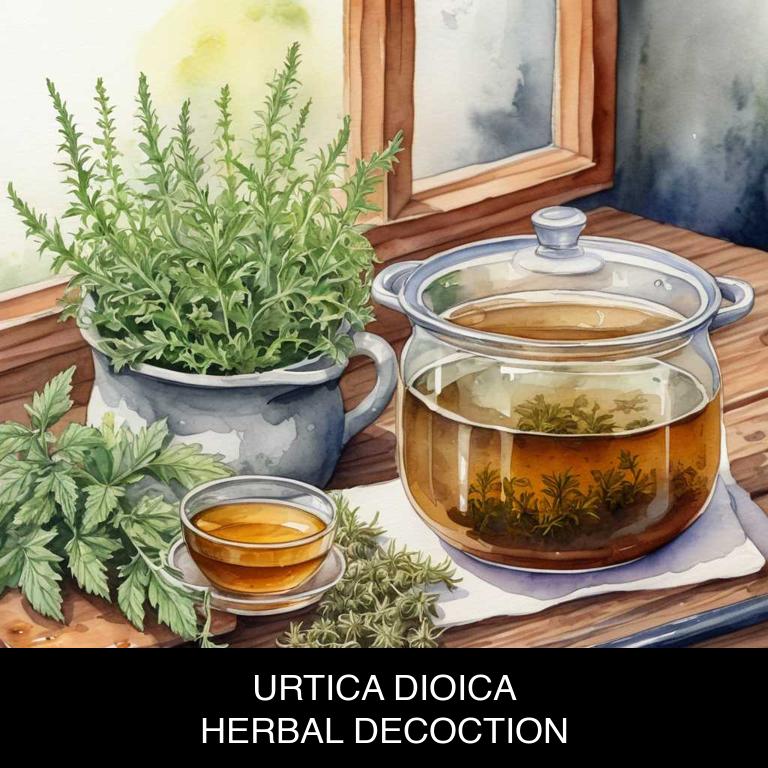
Medicinal Constituents
The list below shows the primary medicinal constituents in Urtica dioica decoctions that help with hoarse voice.
- Saponins: These compounds have anti-inflammatory properties that can help reduce swelling and irritation in the vocal cords, promoting a smoother and clearer voice.
- Flavonoids: As antioxidants, flavonoids can protect the vocal cords from oxidative stress and damage caused by free radicals, which may contribute to hoarseness.
- Furanocoumarins: These compounds have been shown to have anti-inflammatory and antioxidant effects, which can help soothe and heal the mucous membranes in the throat, reducing inflammation and promoting a healthy voice.
Parts Used
The list below shows the primary parts of stinging nettle used to make decoctions for hoarse voice.
- Leaves: Used for their soothing and anti-inflammatory properties to calm the throat and reduce hoarseness.
- Roots: Used for their expectorant and demulcent properties to help relieve congestion and soothe the mucous membranes of the throat.
- Stems: Used for their anti-inflammatory properties to reduce swelling and soothe the throat, helping to alleviate hoarseness.
Quick Recipe
The following recipe gives a procedure to make a basic stinging nettle for hoarse voice.
- Harvest 20-30 grams of fresh urtica dioica leaves and stems early in the morning or late afternoon when the plant is less.
- Rinse the urtica dioica leaves and stems under cold running water to remove any dirt or debris.
- Combine the 20-30 grams of urtica dioica leaves and stems with 500 milliliters of water in a saucepan.
- Bring the mixture to a boil and then reduce the heat to a simmer for 10-15 minutes.
- Strain the decoction through a cheesecloth or a fine-mesh sieve into a clean glass container.
10. Gaultheria procumbens
Wintergreen decoctions helps with hoarse voice because of its soothing properties that calm inflammation in the throat and vocal cords.
The natural chemicals found in wintergreen, such as methyl salicylate and camphor, work to reduce swelling and ease discomfort, allowing for smoother vocal production. Additionally, the anti-inflammatory compounds help to protect the mucous membranes from further irritation, promoting a clearer and more comfortable voice.
As a result, herbal wintergreen decoctions can provide quick relief from hoarseness and support overall throat health.
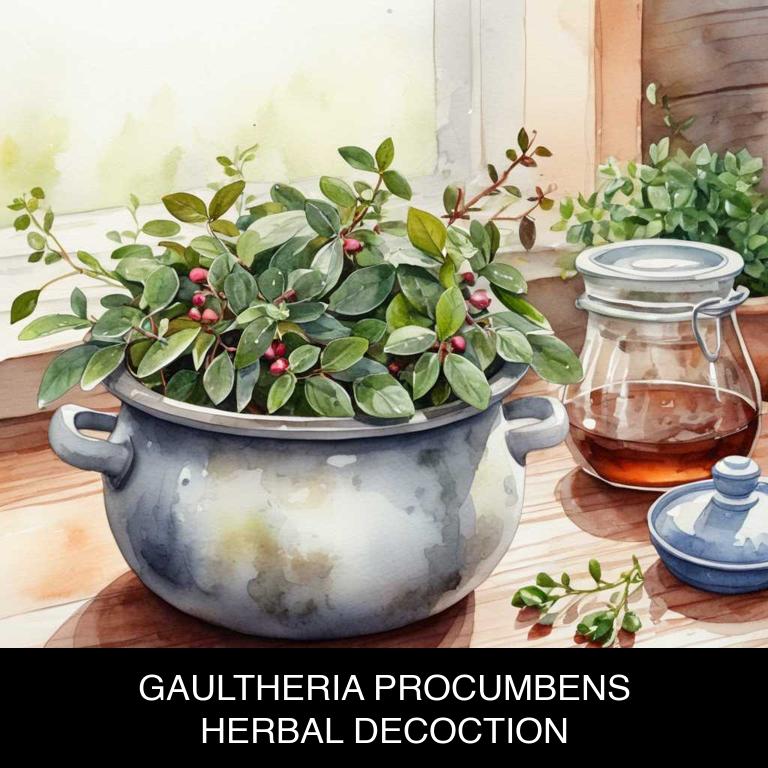
Medicinal Constituents
The list below shows the primary medicinal constituents in Gaultheria procumbens decoctions that help with hoarse voice.
- Iridoids: Iridoids in Gaultheria procumbens, specifically glycosides like glycoside, have anti-inflammatory properties that help reduce throat inflammation, soothing a hoarse voice.
- Terpenes: Bornyl acetate, a terpene in Gaultheria procumbens, exhibits anti-inflammatory and antimicrobial properties, which can help alleviate throat infections and reduce throat irritation that causes hoarseness.
- Phenolic acids: Gallic acid, a phenolic acid present in Gaultheria procumbens, has potent anti-inflammatory and antioxidant properties that can help reduce throat inflammation and oxidative stress, leading to a more comfortable and clear voice.
Parts Used
The list below shows the primary parts of wintergreen used to make decoctions for hoarse voice.
- Roots: The roots of Gaultheria procumbens are primarily used to make decoctions for hoarse voice due to their high content of mucilages, which help soothe and calm the throat.
- Leaves: Gaultheria procumbens leaves are used for this purpose because they contain a high concentration of mucilages and salicylic acid, which aid in reducing inflammation and relieving a hoarse voice.
- Barks: The barks of Gaultheria procumbens are used to make decoctions for hoarse voice due to their content of salicylic acid and other compounds that help to reduce inflammation and alleviate throat irritation.
Quick Recipe
The following recipe gives a procedure to make a basic wintergreen for hoarse voice.
- Gather 2-4 ounces of fresh or dried gaultheria procumbens leaves and stems for the decoction.
- Combine the gathered gaultheria procumbens with 4 cups of water in a medium saucepan.
- Heat the water over medium heat for 10-15 minutes while gently stirring the mixture occasionally.
- Strain the decoction through a cheesecloth or fine-mesh sieve into a bowl to remove solids.
- Allow the decoction to cool completely before transferring it to an airtight container for storage.
What is the best combination of herbal decoctions to use for hoarse voice?
The best combination of herbal decoctions that help with hoarse voice is a blend of Thyme, Licorice root, and Slippery Elm.
Thyme has antimicrobial properties that soothe the throat, while Licorice root reduces inflammation and eases coughs. Slippery Elm, with its demulcent properties, coats and protects the mucous membranes, promoting a speedy recovery. Drinking these decoctions regularly can help alleviate a hoarse voice and support overall throat health, allowing you to speak clearly and confidently once again.
This combination is also gentle on the stomach and easy to make at home.
What ailments similar to hoarse voice are treated with herbal decoctions?
Ailments similar to hoarse voice that are treated with herbal decoctions are respiratory issues such as bronchitis, pneumonia, and chronic coughs.
Herbal decoctions like thyme, eucalyptus, and ginger can help soothe and calm irritated throats, reducing inflammation and congestion.
Other ailments that may be treated with these decoctions include laryngitis, tonsillitis, and sinus infections.